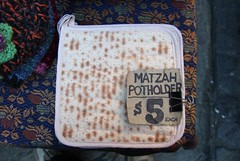It’s Passover, and many Jews observing the holiday will have just cleaned out their chametz (or hametz), the breads, grains and leavened goods.
In her fabulous piece on the Well blog, Karen Barrow gives her take on the practice. Or, if anthropomorphic food is more your speed, Mr. Matzah also explains the idea.
Whether you’re gearing up for Passover, Easter or neither, a little spring pantry  cleaning can’t hurt. Taking stock of the foods you bought but didn’t use can be instructive for avoiding future waste. Barrow uses the occasion as a chance to reflect on her food-buying habits.
cleaning can’t hurt. Taking stock of the foods you bought but didn’t use can be instructive for avoiding future waste. Barrow uses the occasion as a chance to reflect on her food-buying habits.
The problem in my kitchen are the fad-foods bought to satisfy random cravings. They lose their appeal after a few days and end up sticking around too long.
Her words confirm an old Garbage Project belief, that impulse buys and items not often purchased lead to waste.
I can’t criticize religious or cultural practices that cause food waste, but I will say that not all Jews throw out or burn their leavened foods each spring. There are different levels of observance, both personally and officially (Reform, Conservative and Orthodox).
When I was growing up, my dad “sold” our chametz to a colleague for a symbolic buck. While the food remained in our cupboard, it didn’t belong to us until my dad “bought” back the items, thus restarting that glorious flow of Entenmann’s cookies and Oreos.
One thing I can say for sure: Stop Snitchin!
One Trackback
[…] Jonathan Bloom at Wasted Food writes about throwing out food in advance of Passover: I can’t criticize religious or cultural practices that cause food waste, but I will say that not all Jews throw out or burn their leavened foods each spring. There are different levels of observance, both personally and officially (Reform, Conservative and Orthodox). When I was growing up, my dad “sold” our chametz to a colleague for a symbolic buck. […]